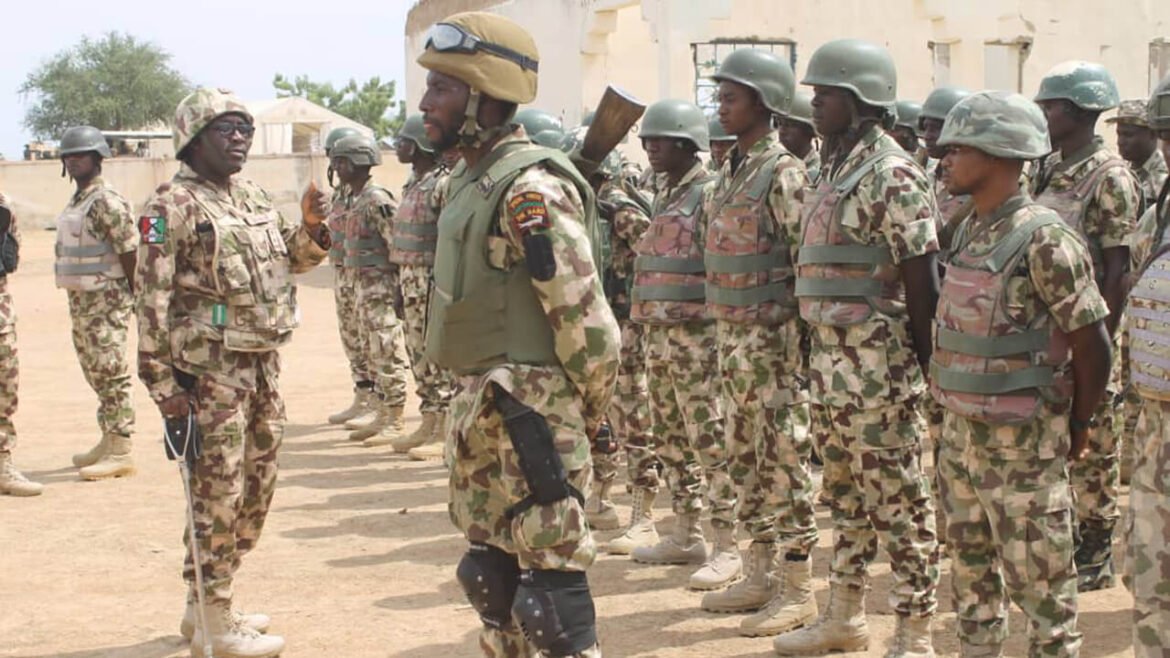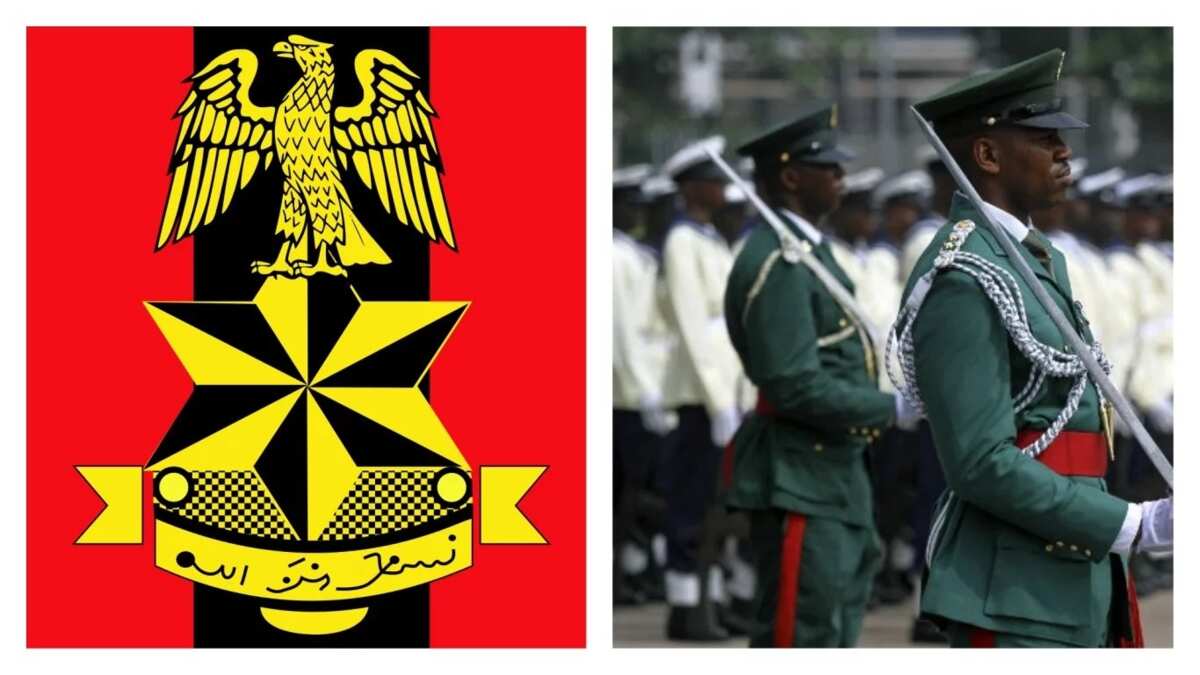Have you ever wondered how the Nigerian Army ranks work? Well, buckle up because we’re about to take a deep dive into the fascinating world of military hierarchy in Nigeria. The Nigerian Army is no joke—it’s one of the most disciplined and respected forces in Africa. Understanding army ranks isn’t just about knowing titles; it’s about appreciating the structure that keeps this massive organization running smoothly. So, let’s get started!
When it comes to the Nigerian Army, ranks play a crucial role in defining authority, responsibility, and hierarchy. These ranks aren’t just random titles—they represent years of training, dedication, and leadership. Whether you’re an aspiring soldier or simply curious about military organization, this article will give you all the insights you need.
From the lowest private to the highest-ranking general, every position in the Nigerian Army has its own significance. We’ll break it all down for you, including the roles, responsibilities, and even some cool facts you probably didn’t know. So, whether you’re here for knowledge or just a good read, you’re in the right place.
Read also:Davido Net Worth A Deep Dive Into The King Of Afrobeats Wealth And Success
Understanding the Basics of Army Ranks in Nigeria
Before we jump into the nitty-gritty, let’s talk about why army ranks matter. In any military organization, ranks serve as a way to establish order and hierarchy. Think of it like a ladder where each rung represents a different level of authority and responsibility. In the Nigerian Army, ranks aren’t just about wearing fancy insignias; they signify expertise, experience, and leadership abilities.
So, what exactly does the Nigerian Army rank structure look like? It’s divided into two main categories: enlisted ranks and officer ranks. Enlisted ranks are the backbone of the army, while officer ranks are responsible for leadership and decision-making. Let’s break it down further.
Enlisted Ranks: The Backbone of the Nigerian Army
Enlisted ranks in the Nigerian Army are the backbone of the force. These are the soldiers who carry out the day-to-day operations and ensure that the army functions efficiently. Here’s a quick overview of the enlisted ranks:
- Private (Pte): The lowest rank in the army, privates are the new recruits who are just starting their military journey.
- Lance Corporal (L/Cpl): A step up from private, lance corporals have a bit more responsibility and leadership potential.
- Corporal (Cpl): Corporals are experienced soldiers who often lead small teams.
- Sergeant (Sgt): Sergeants are senior enlisted personnel who play a crucial role in training and mentoring junior soldiers.
- Staff Sergeant (SSgt): Staff sergeants have even more responsibility and are often in charge of larger teams.
- Warrant Officer Class II (WO2): Warrant officers are highly experienced and serve as a bridge between enlisted ranks and officers.
- Warrant Officer Class I (WO1): The highest enlisted rank, warrant officers class I are trusted advisors to officers and play a key role in decision-making.
These enlisted ranks are the backbone of the Nigerian Army, and each one has its own unique role and responsibilities. Without them, the army simply wouldn’t function as effectively.
Officer Ranks: Leading the Way
Now let’s talk about the officer ranks. Officers in the Nigerian Army are responsible for leadership, strategy, and decision-making. They undergo extensive training and education to prepare them for their roles. Here’s a breakdown of the officer ranks:
Junior Officer Ranks
Junior officers are the ones just starting their careers in leadership. They include:
Read also:Amanda Bynes Married The Full Story Drama And Everything You Need To Know
- Second Lieutenant (2Lt): The lowest officer rank, second lieutenants are fresh out of training and are learning the ropes of leadership.
- Lieutenant (Lt): Lieutenants have more experience and often lead platoons.
- Captain (Capt): Captains are more experienced leaders who often command companies.
These junior officers are the future leaders of the Nigerian Army, and they play a vital role in shaping its direction.
Field Officer Ranks
Field officers are more experienced and have greater responsibilities. They include:
- Major (Maj): Majors often command battalions and are key players in operational planning.
- Lieutenant Colonel (Lt Col): Lieutenant colonels have significant leadership roles and are responsible for larger units.
- Colonel (Col): Colonels are senior leaders who often serve as commanders of regiments or brigades.
Field officers are the ones who make things happen on the ground. Their experience and expertise are crucial to the success of military operations.
The Senior Ranks: The Cream of the Crop
Finally, we have the senior ranks, which include the highest-ranking officers in the Nigerian Army. These are the ones who shape the overall strategy and direction of the force. Here’s a look at the senior ranks:
- Brigadier General (Brig Gen): Brigadier generals command brigades and play a key role in operational planning.
- Major General (Maj Gen): Major generals are responsible for larger units and have significant influence over military strategy.
- Lieutenant General (Lt Gen): Lieutenant generals are among the highest-ranking officers and often serve in top leadership positions.
- General (Gen): The highest rank in the Nigerian Army, generals are the ones who make the big decisions and lead the entire force.
These senior ranks are the cream of the crop, and their leadership is essential to the success of the Nigerian Army.
The Role of Ranks in Military Operations
Ranks aren’t just about titles; they play a crucial role in military operations. Each rank has specific responsibilities and duties that contribute to the overall success of the army. For example, privates focus on executing orders, while generals focus on strategy and leadership. This clear division of roles ensures that everyone knows what they need to do, which leads to more effective operations.
Additionally, ranks help establish a chain of command, which is essential in military situations. When orders need to be given quickly, the chain of command ensures that they are communicated efficiently and effectively. This structure is what makes the Nigerian Army such a well-oiled machine.
How Ranks Affect Morale and Discipline
Ranks also play a role in maintaining morale and discipline within the army. Soldiers who work hard and demonstrate leadership qualities can move up the ranks, which serves as a motivation to perform better. At the same time, the clear hierarchy helps maintain discipline, as soldiers know exactly who to report to and who is in charge.
This system of ranks and responsibilities is what keeps the Nigerian Army running smoothly. It’s not just about following orders; it’s about understanding your role in the bigger picture.
The Evolution of Nigerian Army Ranks
Like any organization, the Nigerian Army has evolved over time, and so have its ranks. The history of the army is a fascinating one, and it’s worth taking a look at how the ranks have changed over the years.
In the early days of the Nigerian Army, the ranks were influenced by British military traditions. Over time, however, the army has developed its own unique system that reflects its culture and needs. Today, the ranks are a blend of tradition and modernity, with a focus on professionalism and effectiveness.
This evolution is a testament to the adaptability of the Nigerian Army. It’s always looking for ways to improve and stay relevant in a rapidly changing world.
Modern Challenges and the Role of Ranks
In today’s world, the Nigerian Army faces a variety of challenges, from regional conflicts to cybersecurity threats. Ranks play a crucial role in addressing these challenges by ensuring that the right people are in the right positions to make informed decisions.
For example, senior officers are responsible for developing strategies to combat terrorism, while junior officers focus on executing those strategies on the ground. This division of labor is what allows the army to tackle complex issues effectively.
How to Climb the Ranks in the Nigerian Army
If you’re thinking about joining the Nigerian Army, you might be wondering how to climb the ranks. It’s not an easy journey, but it’s definitely worth it. Here are some tips to help you get started:
- Work Hard: Dedication and hard work are the keys to success in any military career. Show up every day ready to give your best effort.
- Seek Leadership Opportunities: Look for chances to take on leadership roles, even if they’re small at first. This will help you develop the skills you need to move up the ranks.
- Stay Educated: Education is crucial in the military. Whether it’s attending courses or staying up-to-date with the latest developments, knowledge is power.
- Build Relationships: Networking is important in any field, and the military is no exception. Building strong relationships with your peers and superiors can open doors for you.
Climbing the ranks in the Nigerian Army takes time and effort, but it’s a rewarding journey that can lead to a fulfilling career.
Conclusion: Why Understanding Army Ranks Matters
Understanding the ranks of the Nigerian Army is more than just knowing titles; it’s about appreciating the structure and hierarchy that make this force so effective. From privates to generals, every rank plays a crucial role in ensuring the success of the army.
So, whether you’re an aspiring soldier or just a curious reader, we hope this article has given you a better understanding of the Nigerian Army ranks. Remember, the army is a complex and dynamic organization, and its ranks reflect that complexity.
Now that you’ve learned all about Nigerian Army ranks, why not share this article with your friends? Or better yet, leave a comment and let us know what you think. Who knows, maybe one day you’ll be climbing the ranks yourself!
Table of Contents
- Understanding the Basics of Army Ranks in Nigeria
- Enlisted Ranks: The Backbone of the Nigerian Army
- Officer Ranks: Leading the Way
- Junior Officer Ranks
- Field Officer Ranks
- The Senior Ranks: The Cream of the Crop
- The Role of Ranks in Military Operations
- How Ranks Affect Morale and Discipline
- The Evolution of Nigerian Army Ranks
- Modern Challenges and the Role of Ranks
- How to Climb the Ranks in the Nigerian Army


